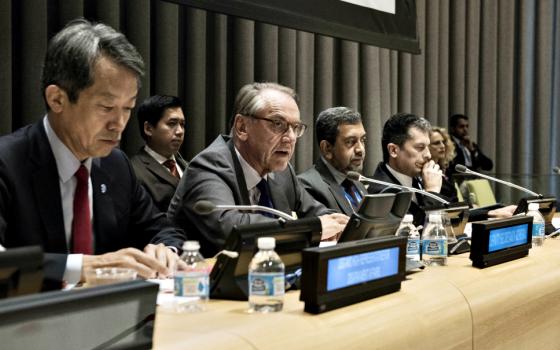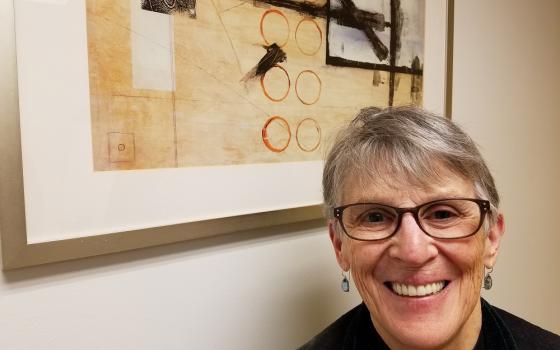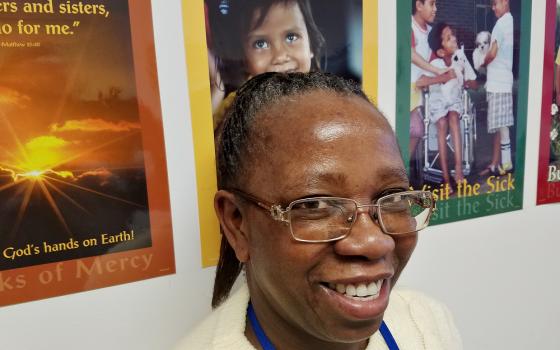When the Cold War ended, the world turned away from worries about nuclear weapons — though groups of Catholic sisters and peace activists never entirely dropped the issue.
Now, rising international tensions and the election of U.S. President Donald Trump are refocusing attention on a problem sisters and activists believe deserves immediate action.
"It has always occurred to me, how can we ignore these things?" said Sr. Stacy Hanrahan, who represents the Congregation of Notre Dame at the United Nations and is active in U.N.-based nuclear disarmament efforts.
The signs of new attention to the nuclear issue are partly due to Trump. Following the November presidential election, he tweeted, "The United States must greatly strengthen and expand its nuclear capability until such time as the world comes to its senses regarding nukes." A spokesman later walked back the comments, saying Trump was expressing worry about nuclear proliferation, particularly among unstable countries and terrorist groups.
One focus is North Korea, whose nuclear weapons capability worries the U.S. and its neighbors. Last week, North Korea's main ally, China, said it will ban items for export to North Korea, such as plutonium, that could be used by North Korea for strengthening its nuclear weapons program, The Associated Press reported.
A jittery world is worried about North Korea — but also anxious about the new U.S. president.
On Jan. 26, the respected Bulletin of the Atomic Scientists, a journal focused on nuclear and environmental issues, said the world is "more dangerous" than it was a year ago. As a result, the magazine decided to move the minute hand of its "Doomsday Clock" 30 seconds "closer to catastrophe. It is now two minutes and 30 seconds to midnight."
In announcing the decision, the magazine laid a good deal of its decision on Trump, saying that "words matter," and that Trump's "statements and his actions as president-elect have broken with historical precedent in unsettling ways."
It added that Trump has "made a bad international security situation worse," in part by making "ill-considered comments about expanding the U.S. nuclear arsenal."
The magazine said that if public officials do not act immediately, "wise citizens must step forward and lead the way."
Pressure from worried non-nuclear nations
"Wise citizens" and nuclear disarmament activists might find an ally with the United Nations. The worsening international situation is prompting the world body to take a fresh look at nuclear-related concerns. In late 2016, the U.N.'s General Assembly approved the creation of a conference to be held in late March that will begin negotiating a "legally binding instrument" to outlaw nuclear weapons with the goal of eventually eliminating them.
While 123 member states supported the resolution, key members of the U.N. Security Council — including the United States, the United Kingdom, France and Russia — opposed the move, as did non-members Japan, Germany and Israel. China, a member of the Security Council, abstained.
Inter Press Service reported that, except for China, "the no votes included all of the countries permitted to possess nuclear weapons under the current UN non-proliferation treaty which was adopted in 1968."
That treaty allows only five countries — China, France, Russia, the United Kingdom and the United States — the right to possess nuclear weapons. However, the 1968 treaty has been routinely ignored, with Pakistan, India, Israel and North Korea all possessing nuclear weapons. There are an estimated 17,300 nuclear weapons in the world, Hanrahan said, citing figures from the Federation of American Scientists.
The pressure from worried non-nuclear nations is driving the movement for the March 27-31 meeting. "Momentum for the vote on calling the ban treaty conference has been building for a few years, fueled by non-nuclear countries' frustration at the lack of nuclear disarmament progress," said Guy Quinlan, president of the Lawyers Committee on Nuclear Policy. The movement accelerated in the fall of 2015, he said, when the nuclear powers failed to offer any substantive action during a U.N. nonproliferation treaty review conference.
"Even here, people's eyes glaze over" about the nuclear issue, Hanrahan said in a recent interview with GSR. But that is not the case within religious congregations. "People in my congregation say, 'What can we do about this?' 'Why do they [nuclear-armed states] want these weapons?' "
Yet Hanrahan and others say there is a direct link between eliminating nuclear weapons and the goals to eliminate poverty and to create a more sustainable environment.
Whether it is the threat posed by nuclear weapons themselves or the expense in producing, maintaining and upgrading them — at a cost of billions — the connections are real, Hanrahan said. "We have to see this issue as primary if we want a sustainable life on this planet," she said. "We have to be looking at climate change and disarmament together."
Maryknoll Sr. Elizabeth Zwareva, a Zimbabwean who works at the Maryknoll Office for Global Concerns at the U.N., agrees. "The agenda the U.N. has set forth can be destroyed in the blink of an eye [by nuclear weapons]," she said. "What are we working for if we have that constant danger hanging over us?"
Zwareva is also concerned about the problems, both direct and indirect, caused by the manufacture of nuclear weapons themselves. Mining for uranium, for example, results in poisonous debris, polluted water and land, and subsequent high cancer rates in uranium-rich places like New Mexico — the site of the world's first nuclear test detonation in 1945.
"The nuclear issue is very much linked to the development issue: It affects the Earth, and the peoples of the Earth, particularly indigenous peoples," Zwareva told GSR.
Like Hanrahan, Zwareva believes that, amid growing worries, the issue of nuclear disarmament and the links between nuclear arms and the environment will be getting more attention in coming years. Both sisters argue that the resources spent on nuclear weapons would be better spent on environmental protection.
Unpredictable global power politics
What remains unpredictable, of course, are global power politics, which always drive the nuclear arms race.
Trump's predecessor, Barack Obama, wanted to make the nuclear arms issue a cornerstone of his presidency. But Obama got bogged down in internal U.S. politics and a host of international challenges, the sisters said. Still, Zwareva and Hanrahan give Obama credit for at least championing the issue as best he could.
The picture of Trump is not nearly as clear, with the new president making declarations of both improved relations with Russia and a call for a renewed arms race. "He has sent mixed messages," Zwareva said. "We're waiting to see which way he turns. It's a point of real uncertainty right now."
Quinlan, a New York attorney who works with Zwareva and Hanrahan on the U.N.'s Non-Governmental Organization (NGO) Committee on Disarmament, Peace and Security, said in an interview that better relations between the U.S. and Russia are possible. But Trump's penchant for unpredictable and "off-the cuff" remarks does not inspire confidence on the nuclear issue. "It could be disastrous," Quinlan said.
Worries about Trump's temperament and "his finger on the nuclear button" were an oft-heard concern during the 2016 presidential campaign, and continue now that Trump is president. But a wider question needs to be asked, Quinlan told GSR: "Do you want any one person with fingers on the nuclear button? Should anyone have that responsibility?"
The issue of hair-trigger response and a possible accidental nuclear war "sometimes keeps me up at night, literally," said Quinlan. There have been several near instances of an accidental nuclear exchange since the 1980s, he noted. Sheer luck, more than any other factor, may have prevented a global catastrophe so far, he said.
A 2015 report by the Global Zero Commission on Nuclear Risk Reduction plainly stated the challenges posed by nuclear weapons: "Warning and decision times are getting shorter, and consequently the potential for fatal human error is growing larger."
During last year's presidential election, a group of U.S. religious leaders, including seven representatives of Catholic women's religious orders, signed a declaration sent to U.S. presidential candidates. The statement noted that both the United States and Russia "still maintain hundreds of nuclear missiles ready for launch on a few minutes' notice. On several occasions, through human or computer error, the world has come within minutes of accidental nuclear war. Many senior military and national security experts have criticized this alert posture as unnecessary and excessively dangerous."
The declaration also noted a host of challenges and dangers, including deteriorating relations between Russia and members of NATO, as well as how the "dangers of accidental or unauthorized nuclear conflicts are also increasing because of developments in cyber warfare, and the threat of hacking by terrorist groups or rogue states."
Citing the belief that there "can be no moral justification for continuing to subject humanity and the planet to this kind of danger," the religious leaders urged the presidential candidates, if elected, "to make the lowering of nuclear missile alert levels a major priority."
'We can't let this happen again'
These concerns are not the only worry for Quinlan and others. Another is climate change, with fears that tensions between states over climate-caused problems could escalate.
One potential flashpoint is South Asia, where tensions between India and Pakistan over water rights could "go nuclear." Quinlan noted that one Pakistani newspaper has declared that a nuclear exchange is possible over the issue of water.
Even a limited nuclear exchange could be disastrous for the entire planet and could put billions at risk for famine, Quinlan said.
Such worries are raised by Quinlan and the sisters in their work on the NGO Committee on Disarmament, Peace and Security. The committee — the major forum for work on nuclear issues by sisters at the U.N. — is one of the oldest bodies of representatives of nongovernmental organizations at the United Nations. It serves as a liaison of sorts between grassroots disarmament groups and the world body.
In recent years, Hanrahan said the committee has "been struggling to get to a new place," and that is partly because of the lower visibility of the nuclear issue since the end of the Cold War.
Hanrahan believes the committee may now be in a position to be re-energized. Quinlan agrees, saying the group, which he affirmed remains "active," is looking at changes, such as revising bylaws, that might give it more of a profile both inside and outside the U.N.
No one expects it will be an easy fight for the world to either eradicate or at least reduce the risk of use of weapons that serve no rational purpose and are not good for humanity, Zwareva said.
"People say, 'Oh, we've had peace with nuclear weapons.' What peace? There have been so many wars since the end of World War II. I don't see how these weapons are helping the U.S. or any other country. Have they stopped wars? No."
"It's going to be a struggle," she said about efforts to eliminate the nuclear threat. "No one is going to say, 'I will get rid of mine.' "
Building awareness is crucial, Zwareva said — a belief also championed by Hanrahan. She was born in 1946 and experienced the Cold War bomb-shelter drills of the 1950s and early 1960s while growing up in Connecticut.
A big step in Hanrahan's own journey about nuclear weapons was a 2004 visit to Hiroshima and Nagasaki, Japan, the two cities that suffered the consequences of nuclear attacks at the end of World War II.
"Those were extremely powerful experiences and conveyed to me the message of 'no more' and of peace-building. It was quite clear, what I heard and saw: We can't let this happen again."
Quoting the poet T.S. Eliot, who famously wrote, "Humankind cannot bear very much reality," Hanrahan said the activism of sisters and others is a clear-eyed response to danger that is real, but can be eliminated.
When it comes to issues like nuclear disarmament that have bearing on the protection of the Earth and of creation, Hanrahan said humans need to take bold and concrete steps.
Citing the example of Jesus, who offered the vision of a world without fear, Hanrahan said, "We are being called to a different way of being."
[Chris Herlinger is GSR international correspondent. His email address is cherlinger@ncronline.org.]



